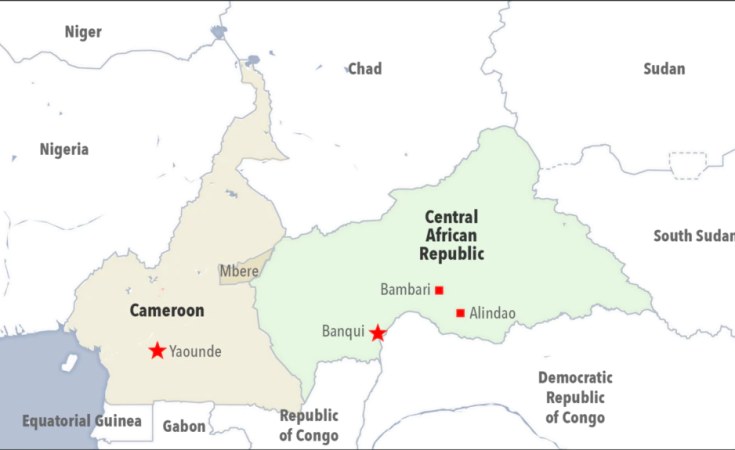Yaounde, Cameroon — Government officials in Cameroon and the Central African Republic say the number of civilian kidnappings has spiked along their borders, with armed gangs and rebels demanding as much as $50,000 in ransom.
In addition to the abductions, the rebels and armed gangs loot markets and ranches and send villagers fleeing for safety, said officials in Cameroon's eastern border with the Central African Republic, or CAR.
Abdoulahi Bobo, a cattle rancher, said his two wives, three children and elder brother have yet to be found a week after they were taken to the bush by armed men. He said the abductors called him and demanded payment of about $10,000 to secure his family's freedom.
Bobo spoke to VOA by messaging app on Thursday from Cameroon's eastern district of Ngaoui, which borders Mont Ngaoui, the highest point in the Central African Republic. He said his family may have been taken to the mountain or neighboring forests.
Cameroon and CAR said rebel attacks are reported on both sides of the border almost daily.
Oumarou Abbo, mayor of Nyambaka, the capital of Cameroon's Nyambaka district, said the rebels and armed gangs also attack remote communities throughout the district, so he has created militias in all the villages of his district to help government troops fight hostage takers. The militias are expected to report strangers as well as places where rebels and armed gangs hide, he said.
Cameroon and CAR officials said that some armed rebels disguise themselves as people displaced by the ongoing armed conflicts in CAR.
The U.N. peacekeeping mission to CAR, known as MINUSCA, which has troops from Cameroon, this week said forces were deployed to border regions to fight the rebels and seize weapons the rebels abandon when attacked. Cameroon and CAR officials said armed gangs often collect weapons abandoned by rebels and use them in either abducting civilians or stealing.
Cameroonian Defense Minister Joseph Beti Assomo said President Paul Biya dispatched him to Motcheboum -- about halfway between the capital, Yaounde, and the border with CAR -- to mobilize troops for civilian protection.
Kildadi Taguieke Boukar, governor of Cameroon's Adamawa region, said rebel attacks on civilians have also been reported along Cameroon's northern border with Chad. He said that government troops were deployed to the Adamawa region immediately to protect civilians after Assomo's visit.
Boukar said military posts in all districts where the kidnappings are happening have been equipped with enough troops, weapons, artillery, vehicles and tracking devices. Troops with special training to investigate, arrest or eliminate armed gangs and rebels have also been deployed to protect civilians on both sides of the porous and permeable border between Cameroon and the CAR, he said.
In December, defense ministers from Cameroon and the CAR agreed to deploy a joint force along the 900-kilometer (560-mile) border to protect civilians. The ministers said the joint force would also seize weapons that rebels hid in border towns and villages.
Civilians said that after those troops retreated in March, rebels relaunched kidnappings and increased the ransoms from $20,000 to $50,000. Abductees whom rebels suspect of collaborating with government troops are tortured and ordered to pay more, according to border villagers.
Cameroonian military officials said the majority of abductees are merchants and cattle ranchers.
Cameroon officials said the nation is intensifying collaboration with neighboring countries to safeguard civilians.


